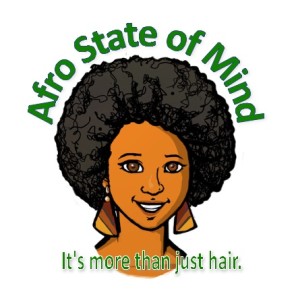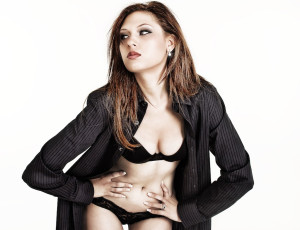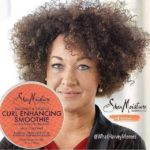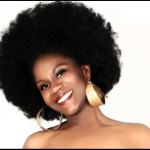 “So…what do you think about natural hair?” the moderator asked. The audience full of female lawyers of color grew quiet as we waited for the panel’s response.
“So…what do you think about natural hair?” the moderator asked. The audience full of female lawyers of color grew quiet as we waited for the panel’s response.
It was a loaded question. This was a forum on business development for female attorneys. The room was packed with melanated (by “melanated” I mean people with melanin) women, many of whom were Black. Many of whom wore natural hair. Myself included.
As I gazed around the room I noticed that not only were a lot of the Black attorneys wearing natural styles – but most of those natural heads were wearing hair that was 1 – 2 inches in length, fluffed out into short Afros.
The whole scene reminded me of the bru-ha-ha that erupted when an unnamed Glamour magazine beauty editor had a run in with nappiness at a law firm. The editor was providing a workshop on the “dos and don’ts of corporate fashion.” Can you see where this is going? As noted by the folks over at Jezebel.com, this workshop came complete with slides. And pictures. Of Black people being Black at work with Black hair.
The editor’s presentation went something like this:
First slide up: an African American woman sporting an Afro. A real no-no, announced the ‘Glamour’ editor to the 40 or so lawyers in the room. As for dreadlocks: How truly dreadful! The style maven said it was ‘shocking’ that some people still think it ‘appropriate’ to wear those hairstyles at the office. ‘No offense,’ she sniffed, but those ‘political’ hairstyles really have to go.
For Black professional women, the issue of hair in the workplace is always a serious one. So it was really surprising that none of the panelists – all of whom were women of color who worked as law firm partners or in-house attorneys – had much to say about the topic.
One of the panelists took a stab at answering the question. As she spoke her hand almost seemed to unconsciously stroke her own very short hair. She said she’d always worn her hair short and knew that some people would have a problem with it. So she always made sure that she was perfectly attired otherwise so as to put minds at ease. None of the other panelists had much to offer on the subject so they deftly moved the conversation to another topic.
After the panel concluded, many of the natural women I spoke with expressed similar sentiments. First there was the way the question had been introduced. The “natural hair” issue was thrown into the part of the conversation that discussed why cleavage and short skirts in the office were big no-nos.
Really? Wearing my hair the way it was made to be worn is as bad as showing up to work looking like a Black Dolly Pardon wearing booty shorts and flip-flops? That definitely did not go over well.
Then there was the overall dissatisfaction with the surface level answer that was offered. Telling an audience of smart upwardly mobile Black women that you always wear short hair is not helpful when the topic is Black natural hair in the workplace. Especially when those women are busy navigating the historical race-gender-class-nappiness obstacle course.
I approached one of the panelists after the event to see if perhaps there was anything more she had to say about the topic of Black hair in professional settings.
She did.
As we spoke I mentioned that in my experience, it seemed as if Black professionals were the ones that seemed concerned about natural hair – more so than White colleagues.
“Oh no!” she responded before going on to declare that young girls today just don’t know how to make their hair look “neat.” She indicated that due to her position she is privy to conversations with other White partners who speak with her behind closed doors about their nappy-headed discomforts. One of the main complaints she heard was that “nappy hair is not neat.”
Since there was a line of people waiting to speak with her I wasn’t able to ask any follow-up questions. But if I could have had a few more minutes of her time, here’s what I would have liked to know:
- When those White Partners come to you “complaining” about natural hair – do you explain to them that Black hair has different standards and is structurally different than White hair?
- Do you explain why some Black women who choose to straighten their hair do so in an effort to make it do something it was never designed to do?
- Do you stand in the gap for those super smart, overachieving, natural haired Black women the way your forbearers did for you when women could not work at law firms at all, let alone a Black female making partner?
- Do you serve as an advocate for those value adding, bar-exam passing, top of their class smart, natural haired Black women?
- Or do you – like many Black elders – put White discomfort at ease by co-signing on the idea that natural hair indicates a lack of professionalism? Do shake your head and communicate a message to those young lawyers that Black women in your firm must straighten their hair in order to get ahead – in spite of their brilliance?
- Do you apologize for our nappiness and wish you could explain it away?
- Do you cringe when you see the new natural heads in the fresh crop of lawyers and hope they get assigned to someone else’s practice group?
- Do you follow in the footsteps of *esteemed* institutions like Hampton University and declare that nappy negroes need not apply?
Regardless of how the panel members would answer those questions, I wonder if they would make the same choice if they were Asian female partners and a White male partner complained to them that more Asian’s don’t get eyelid restructuring surgery so their eyes can look “neater”?
I wonder if those panelist would see it the same way if the White male partner were complaining about Muslim women attorneys who veil their hair altogether?
Because if you are one of those senior Black professionals who sacrifices Black women who wear their hair in the most logical way for their hair to be worn, out of your own discomfort with nappiness, then you are on the wrong side of history and on the wrong side of this issue.
Natural hair in the workplace is not about “neatness.” Though I’m aware that many who protest against naps moving up the corporate ladder do so out of professed “concerns” for whether or not one’s hair can be simultaneously nappy and “neat.”
When we use the word “neat” in this context – let us recognize what it really means. The word “neat” is about conforming to a standard that says Blackness – whether it is Black hair, skin color, nose/lip/body size is not acceptable “as it is.” This standard says that “Whiteness is the norm” to which “Blackness must adjust.” When Black women are told nappy hair has to be “neat” we know that this is a code word for “straight” or “White.” Straight, blonde, White girl hair is the baseline against which other hair styles are measured – even when respected Black professionals whose hair could never do or be any of those things – are the ones being measured.
So for those Black professionals who are uncomfortable with nappy hair – you may want to ask yourselves why. Black hair is not a browner version of White hair. It was not made to look like White hair. The standards for evaluating Black hair have to start with Black hair – as it is – as the baseline measurement for Black women.
Besides…natural Black women have come too far to go back into the nappiness closet. We are here, we are nappy, we aren’t going anywhere and we could get a lot more done in the workplace if we weren’t constantly dealing with the racist constructs for our hair. Kindly step aside as we and our nappiness work our magic. You – and your corporation – would be better off for it.
If you dare to wear natural hair (gasp!) in the workplace, then consider being part of the Naturally Professional Project, a compilation of natural hair images and interviews designed to spread the “Professional” beauty if natural hair!
********
Looking for more thoughts from an Afro State of Mind? Check out my book Afro State of Mind: Memories of a Nappy Headed Black Girl now available on Amazon.com in paper back or e-book! And if you want to stay connected follow me on Twitter, “like” Afro State of Mind on Facebook or catch up on my latest youtube videos! Don’t forget to check out Afro State of Mind Radio, Sunday mornings at 10 am on iArtistRadio.com – this week we continue our month long spotlight on Black education. Enjoy!






What a wonderfully well-written essay that perfectly expresses the frustration black women (“nappy”-haired or not) often face in the workplace. I definitely agree with your assessment of the panel. With that said, I have a couple points. While in some contexts, “neat” can be a code word for straight hair, I don’t think the word itself is so black and white. As we all know, even within the natural hair community, there are certain “no-nos”. Yes, it’s cute to rock a well-coifed ‘fro or twist-out, but what about other styles that are, well, a bit “messier?” Even natural-haired WOC respond negatively to such styles; is it really much of a leap to see others responding the same? Secondly, I think it’s important not to “box” people into pre-set categories based on how their hair looks to us. Each woman’s hair is a personal to her and unless we have been up-close in her hair journey, we can’t make the leap that her straight locks equals making it “do something it was never designed to do” or that their hair is so structurally different that it has to look like a bird’s nest—and that goes for white women as well as women of color. I think your essay was very thoughtful and thought-provoking, and I hope it wakes people up to this very culturally-embedded form of racism.
Another great piece Lurie. Oh, how I wish I was there. It’s really time we start to “be free” and put this behavior aside:
Or do you – like many Black elders – put White discomfort at ease by co-signing on the idea that natural hair indicates a lack of professionalism? Do shake your head and communicate a message to those young lawyers that Black women in your firm must straighten their hair in order to get ahead – in spite of their brilliance?
Thank you for this article. I am mixed race, but my hair type takes predominatly from my Black side of the family. It took years to embrace my natural hair and I still run into people, mostly Black women, who do not agree with it. My White fiance adores my hair and I do too. This article really speaks what I think and gives me the courage to keep my natural hair in the workplace. Black women must unite and support eachother on this issue. When I finally adopt children, if they have hair like mine, I want them to know that they are beautiful naturally and do not need to conform to a Eurocentric beauty standadrd.